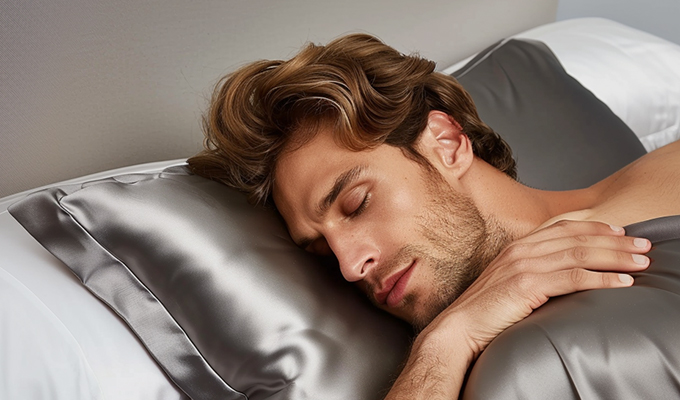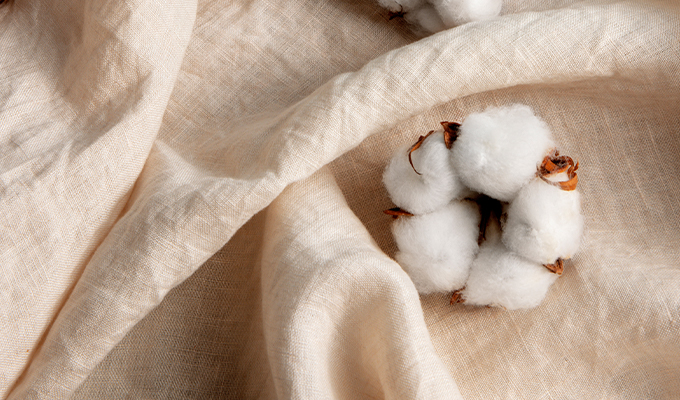Silk vs Cotton Pillowcases: Which Is Best for Your Hair?
- by Kobla Kugbega
- Apr 3, 2024
- |
- 10 min read
In the realm of self-care and beauty routines, the significance of a good night's sleep on hair health is often overlooked. However, the choice of your pillowcase material can make a substantial difference. The debate surrounding a “Silk vs Cotton Pillowcase” has become a topic of considerable interest, with advocates on both sides championing the unique advantages of each. Whether you're aiming for smoother, frizz-free locks or simply seeking a more comfortable slumber, understanding the qualities of silk and cotton pillowcases is essential.
In this article, we will explore the nuances of this long-standing debate, guiding you towards an informed decision on the fabric that suits you best depending on whether you’re looking for pillowcases for hair loss, your hair health or to prolong your hair system’s lifespan.
What is Silk?
Silk is a natural fiber produced by silk-producing insects, primarily silkworms. The most common type of silk comes from the domesticated silkworm species Bombyx mori, which is raised for silk production. Silkworms spin cocoons using a fluid they produce, and these cocoons are harvested and processed to extract silk fibers.
Silk is renowned for its luxurious texture, sheen, and smoothness. It has been highly valued for centuries and is often associated with high-quality and premium products in the textile industry. The fabric has excellent draping qualities, and its natural temperature-regulating properties make it comfortable to wear in various climates.
Silk is used in the production of various items, including clothing, lingerie, bedding, and accessories. Its unique properties also make silk a popular choice for pillowcases and bed linens, with claims that it can benefit hair and skin health due to its smooth texture and reduced friction.
What are the Benefits of Silk?
Silk pillowcases are often praised for their potential benefits to hair health or a hair system’s lifespan. While individual experiences may vary, some commonly cited advantages of using silk pillowcases for hair include:
- Reduced Friction: Silk is a smooth and slippery material, which means less friction between the hair strands and the pillowcase. This reduced friction can help prevent tangling and breakage, especially for those with delicate, easily damaged hair or hair loss.
- Less Absorption of Moisture: Unlike cotton, silk does not absorb moisture as much. This can be beneficial for maintaining the natural oils in your hair and preventing it from becoming overly dry. Cotton pillowcases, on the other hand, can absorb moisture from your hair, potentially leading to frizz and dryness.
- Gentler on Hair Cuticles: The smooth surface of silk is considered gentler on the cuticles of the hair compared to rougher fabrics. A silk pillowcase for hair loss would especially contribute to less damage and breakage over time.
- Preservation of Hairstyles: Silk pillowcases may help preserve hairstyles for longer periods, as the smooth surface allows the hair or hair system hair to glide over the fabric rather than getting tangled or flattened.
- Reduced Split Ends: The decreased friction and gentle nature of silk may contribute to a reduction in split ends and hair damage, promoting healthier-looking hair.

What is Cotton?
Cotton is a natural fiber derived from the fluffy seed fibers of the cotton plant (Gossypium). Cotton has been cultivated for thousands of years and is one of the most widely used and important natural fibers in the world. The cotton plant produces bolls, which contain the seeds surrounded by fibers. These fibers are processed to create cotton yarn, which is then woven or knitted into various textiles.
Cotton is known for its softness, breathability, and versatility. It has a comfortable feel against the skin and is absorbent, making it suitable for a wide range of clothing and textile products. Cotton fabric is widely used in the fashion industry for items such as T-shirts, jeans, dresses, and bed linens.
Cotton comes in various types and grades, and the quality of the cotton can vary based on factors like fiber length and purity. It is a popular choice for everyday clothing due to its comfort and durability. Additionally, cotton is often used in the production of bedding, including pillowcases and sheets, offering a natural and breathable option for sleepwear.
What are the Benefits of Cotton?
Cotton pillowcases also offer certain benefits for hair, although they differ from those associated with silk. Here are some potential advantages of using cotton pillowcases for hair:
- Breathability: Cotton is a breathable fabric, allowing air circulation through the fibers. This can be beneficial for individuals who may experience scalp issues or prefer a cooler sleeping environment.
- Absorption of Moisture: Cotton can absorb moisture from the hair, which can be advantageous for individuals with oily hair or those who prefer a less glossy look. This can help in reducing excess oils and maintaining a more natural appearance.
- Affordability and Availability: Cotton pillowcases are generally more affordable and widely available compared to silk. This accessibility makes them a practical choice for those who prioritize cost-effective solutions.
- Versatility: Cotton is a versatile fabric commonly used in various types of bedding, including pillowcases. It is easy to care for, durable, and available in a wide range of colors and patterns, allowing for diverse style choices.
- No Slippery Surface: Unlike silk, cotton does not have a slippery surface. While this may lead to more friction between the hair and the fabric, some people prefer the stability offered by cotton pillowcases.
It's important to note that the choice between cotton and silk pillowcases for hair loss or hair systems often depends on personal preferences and specific hair care needs. Factors such as hair type, texture, and individual sensitivities can influence the suitability of each material. Ultimately, experimentation and awareness of one's own hair characteristics play a crucial role in determining which type of pillowcase may be more beneficial for a particular individual.

What is the Difference Between Silk & Cotton?
Both fabrics offer a range of beauty benefits, leaving many wondering how to make the right choice. For most individuals, the determining factor often boils down to the price.
Silk, being a natural fiber, involves a labor-intensive extraction process, and the production of this luxurious fabric comes at the cost of numerous silkworms. Consequently, silk carries a hefty price tag, with top-of-the-line silk pillowcases sometimes reaching several hundred dollars.
On the flip side, there's the option of opting for a quality satin pillowcase made from polyester, providing many similar benefits at a fraction of the cost—often less than $20. While the word "polyester" might conjure thoughts of scratchiness, this is not the case when it's woven using the satin weave. In fact, the touch is so soft that many individuals struggle to distinguish it from genuine silk. It's a reminder that the key lies not so much in the raw material but in the weave, as the satin weave is what imparts that desirable, luxurious feel we all appreciate.
How would you Prepare your Hair System for Sleep?
In addition to selecting the ideal pillowcase for your needs, if you're in pursuit of a tailored bedtime routine crafted specifically for your hair system, consider the following comprehensive routine. Establishing a nightly regimen ensures the longevity and optimal condition of your hair system.
- Nourishing Treatment: Apply a nourishing hair oil, such as argan or Moroccan oil, evenly through the ends of your hair system. This not only adds softness but also provides essential moisture and protection, enhancing the overall health of the hair fibers.
- Gentle Prepping: Begin by gently detangling your hair system using a wide-tooth comb or brush. This step helps to minimize any existing tangles or knots, preventing potential damage during the night.
- Protective Headband: Secure a soft headband along the perimeter of the hair system's base. This not only helps to maintain the position of the hair system but also acts as a barrier, preventing oils from the forehead from affecting the adhesive. It's a crucial step, particularly for those who may experience increased body temperature during sleep.
- Silk or Satin Sleep Cap: Invest in a silk or satin sleep cap to cover your hair piece during the night. This protective layer minimizes friction, reducing the risk of matting and tangling. Additionally, it helps to preserve the style and condition of your hair, ensuring it stays in top-notch shape.
- Morning Unveiling: In the morning, gently remove the sleep cap. If you plan to shower, use a shower cap to shield your hair system from moisture. Opt for lukewarm water during your shower to prevent frizz and maintain the integrity of the hair fibers.
- Post-Shower Care: Following your shower, apply a detangling spray to ease the combing process. Comb through your hair system with a wide-tooth comb, ensuring a smooth and tangle-free result. Finish by blow-drying your hair on a low-heat setting to set the style and enhance the overall look.
By incorporating these steps into your nightly routine, you not only contribute to the longevity of your hair system but also ensure that it remains healthy, soft, and well-maintained.
Keep in mind that the suggestion to wear a silk cap or use a silk pillowcase is merely a recommendation for individuals with hair systems. We understand that not everyone follows this practice.
Silk vs. Cotton Pillowcases: What is Best?
In the grand debate between silk and satin pillowcases, the decision ultimately rests on personal preferences, priorities, and budget considerations. Both materials offer unique advantages for hair and skin care, presenting a luxurious touch and potential beauty benefits. However, as we navigate the final verdict, it becomes evident that the choice between silk and satin is not solely dictated by the raw material but rather by the weave.
Silk, with its natural origins, lustrous appearance, and breathability, is synonymous with luxury. Yet, its premium price tag reflects the labor-intensive process and the sacrifice of silkworms in its production.
On the other hand, satin pillowcases crafted from polyester present an affordable alternative that mimics many benefits of silk. Contrary to preconceived notions of scratchiness, the satin weave in polyester creates a soft and smooth surface, often indistinguishable from genuine silk.
In the end, the final verdict leans toward individual preferences, with considerations for cost, ethical concerns, and the desired aesthetic and tactile experience. Whichever fabric you choose, be it the luxury of silk or the affordability of satin, the key is to find the weave that aligns with your comfort and beauty needs for a restful and luxurious night's sleep.
Experience immediate and remarkable transformations with hair systems designed to effortlessly elevate the appearance of men dealing with hair loss! Opting for a hairpiece from reputable brands such as Lordhair guarantees a blend of realistic aesthetics and comfort, all within a budget-friendly range.
Lordhair excels in creating and dispatching personalized hair replacement systems to more than 100 countries. Our offerings, thoroughly fashioned from 100% human hair, are backed by a 30-day money-back guarantee. Dive into our catalog of men's hair systems to unveil the excellence of our quality and craftsmanship.
Have inquiries? Reach out to us at support@lordhair.com for expert assistance!










































































































